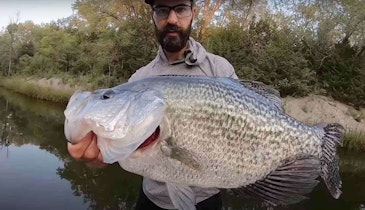Being a weekend warrior isn’t an admission that you don’t want to predator hunt more. Instead, it’s the reality of being an adult in world full of responsibilities. Family, career, children activities, community volunteer programs, church happenings and a host of other duties fill your daily schedule with a list of obligations that just continues to snowball.
How do you make the most of the small windows you chisel away for your predator hunts? You simply embrace the part-time hunter designation with a plan that welcomes the weekend warrior lifestyle.
Put one or more of these strategies into play this season and your weekend warrior title will wear like a badge of honor instead of a strain on your hunting passion.
Scout Well In Advance
The weekend warrior within already knows that time is the limiting factor in adding more predator hunting hours to your season. Don’t waste time on dead-end locations. Scout ahead of time and have a series of hunting locations ready with permission granted for access.
Begin this advanced scouting mission by following up on tips from friends, gossip and online chatter. Sort out fact from fiction with calls to professionals such as local animal damage control officers, state wildlife biologists and even land managers.
Next, secure permission. If the land is public look for all access points to give you downwind entrance options depending on wind direction. If the land is private begin contacting individuals for permission months in advance. GPS map programs like OnXMaps can give you immediate deed holder information for many states and if that fails use plat information found at all county courthouses. Programs like ScoutLook Weather interface with Google Earth for aerial views and interactive graphics aiding your hunt. Plan face to face meetings with landowners. It makes it harder for them to say no as opposed to an anonymous phone call, especially when you relate the sound benefits of predator management.
Finally, avoid the “hot location.” If you pursue rumors of parcels brimming with predators you’ll likely find yourself bumper to bumper with others who heard the same report. Staying away from crowds guarantees a higher take on uneducated predators and more success in your tight schedule.
Vow To Never Return
Once you have your hit list of locations don’t get hooked on your own hotspot that may suddenly surface. Even if you have a particularly good Saturday at a new property, it pays to not revisit it Sunday.
Why? You don’t want to pressure the area too much. Every time you enter and leave a property you deposit scent and possibly even bump animals, including predators. Most animals have a tolerance to human encounters, but repeated contact leads to animals avoiding an area or even being suspicious to your calling, or other tactics.
Of course every rule has an exception and that includes the fact you may have permission to hunt a property consisting of thousands of acres with days of repeated hunting opportunity. Nevertheless, most of you won’t have that type of free-spirit opportunity. After you build your list of predator hunting locations create a schedule that gives each spot a rest for at least one week or more between visits.
Predators have large home territories, several square miles or more, so the odds decrease of educating your target if you give it a break. And if you do get lucky by taking a predator from a location, the natural dispersion of predators guarantees another will eventually move into the location to set up a new home territory. Spreading your visits out between a network of locales should decrease predator wariness, allow new predators to move in and increase overall calling success.
Call The Best Windows Of The Day
Even weekend warriors have “to-do” or “honey-do” lists. After a week at your job you’ll still be staring at yardwork chores, youth softball games, Boy Scout service projects and add your assignments at will. The demands seem never ending and likely won’t until you retire or rest six feet under. For many that means a full day of predator hunting is still a luxury only lived by those on TV hunting shows
Don’t give up the chase yet. Fortunately, predators reside within a short drive of every zip code in North America. Coyotes living in downtown Chicago confirm that statement. Your job, in addition to cleaning out the gutters, is to squirrel away a few hours at the beginning or end of each day.
Dusk and dawn represent the two best windows to hunt predators. Dim light, cooler temperatures and the fact that most predators are actively hunting, or on the move make these windows excellent times to hunt. Mornings might be the best since you can get up early and be on location before anyone is stirring back at home or in the field. You can even get in place before shooting light so you can begin calling at first light. You might even make it back home before the dew dries for a day of mowing.
There are also a growing number of hunters targeting predators after dark when family and career demands begin to diminish. Check your state regulations, but you may be able to hunt predators with the aid of a light or night vision gear. This opens up a period of the day often saved for reality TV escape. You’ll have free time, options to hunt longer and you’ll be able to target predators that are surprisingly bold after the sun goes down.
Call Cover on a Predator’s Schedule
Whether you only hunt dawn or dusk, or have the luxury of an entire weekend day to put the moves on predators, call cover that correlates to a predator’s schedule. In a few regions predators may be on the move throughout the day, but many hole up to avoid human contact, heat and to let their digestive systems percolate.
For effectiveness you need to break down a predator’s schedule. Mornings oftentimes include predators finishing up a day of hunting and then traveling to preferred sanctuary zones. Hunt the edges of fields next to thick brush or rugged terrain. Midday includes trips to get a drink of water and lounging lackadaisically in shaded cover. Target thick cover and look for openings to call a predator through for good shooting visibility. Late in the day again move to the edges of refuge as predators will be leaving loafing areas to again take up the hunt.
One winner in any zip code is to target areas hosting large numbers of livestock such as cows, sheep and poultry. Coyotes especially like to visit these operations looking for a freebie in the form of a weak newborn or a freshly deceased weakling.
Use Your Day Off
If the whole weekend window doesn’t work for you due to shift obligations or family demands, use your day off. Most employers have an obligation to award you time off. Sure you’ll still have to fit in all of those other chores into your days off, but off, midweek hours may be the best for a predator pursuit.
For starters, every other working stiff will be tied to their job during the midweek. Only a small majority of the employed have a schedule that doesn’t follow a workweek routine. This opens up more uncrowded conditions on public lands and being by yourself on private lands where the landowner gave permission to a handful of hunters. It also means your spouse will be at work and the kids will be in school, two distractions that eat up free time.
If you don’t have a midweek shift you still may be able to squeeze in some extra time, midweek or over the weekend. Sit down with your employer and negotiate out a deal where you still put in your eight hours, but on your time schedule. This may not work if you’re a service professional at the Co-op, but if you don’t have customer relations or a job that directly interacts with others, it may work. Tell your employer you’ll be more productive by working early mornings or late evenings, and the occasional break will regenerate your creative side.
Zip Your Lip
One last word of advice to the weekend warrior, zip your lip. After all your scouting, extra effort to complete home chores and employer negotiations, don’t blow your efforts by bragging. Keep your mouth shut and your new location, and schedule hush-hush. Remember that gossip mentioned earlier? A small slip of the lip can lead to others discovering your hunting locations and when you’ve been having the best success.
If you do share it with someone make sure they pinky promise never to reveal your weekend warrior success.






